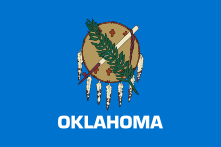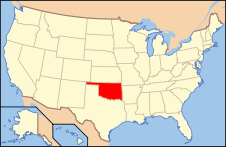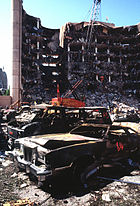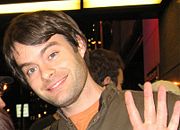- Portal:Oklahoma
-
- Wikipedia portals:
- Culture
- Geography
- Health
- History
- Mathematics
- Natural sciences
- People
- Philosophy
- Religion
- Society
- Technology
Oklahoma (pronounced: /ˌoʊkləˈhoʊmə/) is a state located in the South Central region of the United States of America. With 3,579,212 residents in 2006, it is the 28th most populous and 20th-largest state by land area. Its name is derived from the Choctaw words okla and humma, meaning "red people," and is known informally by its nickname, The Sooner State. Formed by the combination of Oklahoma Territory and Indian Territory on November 16, 1907, it was the 46th state to enter the union. Its people are known as Oklahomans, and its capital and largest city is Oklahoma City.
A major producer of oil and food, Oklahoma is also an important manufacturer of aircraft parts and a leader in biotechnology. It has one of the fastest growing economies in the nation, leading in gross domestic product growth and ranking third among states in per capita income growth. Nearly 65 percent of Oklahomans live in the metropolitan areas of Oklahoma City and Tulsa, and the cities serve as primary economic centers of the state. Six universities ranked high for academic achievement are located in the state, and two rate among the best college sports programs in American history.
Made up of small mountain ranges, prairie, and eastern forests, Oklahoma lies in the Great Plains and Ozark Highlands in a region prone to severe weather, holding the most ecologically diverse terrain in the nation, with more ecoregions per mile than any other state. With a prevalence of German, Irish, and Native American ancestry, more than 25 native languages are spoken in the state, the most in the nation. It is located at a confluence of three major cultural regions, historically serving as a route for cattle drives, a destination for southern settlers, and a government-sanctioned territory for Native Americans. Part of a strip of conservative political views and widespread beliefs in Christianity known as the Bible Belt.
Selected article
The Oklahoma City bombing was a terrorist attack on April 19, 1995 aimed at the Alfred P. Murrah Federal Building, a U.S. government office complex in downtown Oklahoma City, Oklahoma. The attack claimed 168 lives and left over 800 injured. Until the September 11, 2001 attacks, it was the deadliest act of terrorism on U.S. soil.
Just 90 minutes after the explosion, an Oklahoma Highway Patrol officer pulled over 27-year old Timothy McVeigh for driving without a license plate. Within days after the bombing, Timothy McVeigh and Terry Nichols were both arrested for their roles in the bombing. Investigators determined that McVeigh and Nichols were sympathizers of an anti-government militia movement and that their motive was to avenge the government's handling of the Waco and Ruby Ridge incidents. McVeigh was executed by lethal injection on June 11, 2001; Nichols was sentenced to life in prison. A third conspirator, Michael Fortier, who testified against the two conspirators, was imprisoned for failing to warn the U.S. government. As with other large-scale terrorist attacks, conspiracy theories dispute the official claims and point to additional perpetrators involved.
The attacks led to the U.S. government passing legislation designed to increase protection around federal buildings and to thwart future terrorist attacks. Under these measures, law enforcement has since foiled over fifty domestic terrorism plots. On April 19, 2000, the Oklahoma City National Memorial was dedicated on the site of the Murrah Federal Building to commemorate the victims of the bombing. (Read more...)
Spotlight city
Oklahoma City is the capital of the U.S. state of Oklahoma. The county seat of Oklahoma County, the city is the 30th largest in the U.S.. The city's estimated population as of 2006 was 537,734, with a 2006 estimated population of 1,172,339 in the metropolitan area. Founded during the Land Run of 1889, Oklahoma City was the site of the bombing of the Alfred P. Murrah Federal Building in 1995, the largest act of terrorism on American soil prior to the September 11, 2001 attacks and the most destructive act of domestic terrorism in American history.
By the time Oklahoma was admitted to the Union in 1907, Oklahoma City had already supplanted Guthrie, the territorial capital, as the population center and commercial hub of the new state. Soon after, the capital was moved from Guthrie to Oklahoma City. Oklahoma City was a major stop on Route 66 during the early part of the 20th century and was prominently mentioned in Bobby Troup's 1946 jazz classic, "(Get Your Kicks on) Route 66," later made famous by Nat King Cole. (Read more...)
Selected picture
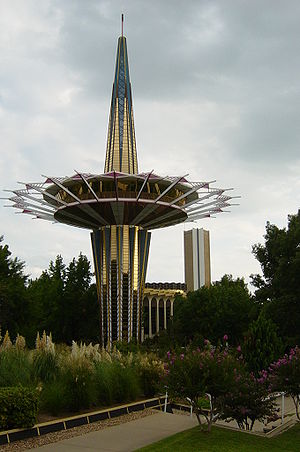
Credit: User:Kralizec!
The Prayer Tower is located in the center of the campus of Oral Roberts University in Tulsa, Oklahoma.Did you know...
- ...that Tulsa is often considered the birthplace of U.S. Route 66?
- ...that Oklahoma has the longest drivable stretch of Route 66 in the nation?
- ...that in 1927, Oklahoma businessman Cyrus Avery, known the "Father of Route 66," proposed using an existing stretch of highway from Amarillo, Texas to Tulsa for the original portion of Highway 66?
- ...that Oklahoman Cyrus Avery spearheaded the creation of the U.S. Highway 66 Association, the organization that oversaw the planning and creation of Route 66, and he placed the organization's headquarters in Tulsa?
Featured content
 Featured articles: Black Seminoles • Chickasaw Turnpike • Jim Thorpe • Oklahoma • Tulsa, Oklahoma • Woody Guthrie
Featured articles: Black Seminoles • Chickasaw Turnpike • Jim Thorpe • Oklahoma • Tulsa, Oklahoma • Woody Guthrie
Featured lists: Oklahoma birds • Tallest buildings in TulsaState facts
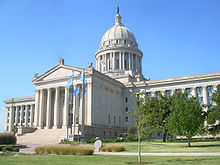 Oklahoma State Capitol building
Oklahoma State Capitol building
- Nickname: The Sooner State
- Capital and largest city: Oklahoma City
- Governor: Mary Fallin (R)
- Total area: 181,196 square kilometers (69,960 square miles)
- Population (2010 census): 3,751,351
- Date admitted to the Union: November 16, 1907
- Senators: James M. Inhofe (R), Tom Coburn (R)
- Representatives: John Sullivan (R), Dan Boren (D), Frank D. Lucas (R), Tom Cole (R), James Lankford (R)
State symbols:
- Mammal: Bison
- Bird: Scissor-tailed Flycatcher
- Fish: White bass
- Floral emblem: Mistletoe
- Flower: Oklahoma Rose
- Grass: Indian grass
- Insect: Honeybee
- Tree: Redbud
- Fossil: Allosaurid dinosaur
- Rock: Rose Rock
- Soil: Port Silt Loam
- Song: Oklahoma!
- Beverage: Milk
Selected biography
William "Bill" Hader, born June 7, 1978 in Tulsa, Oklahoma, is an Emmy- and Peabody award-winning American actor, comedian, writer, producer, and repertory player on Saturday Night Live.
He first appeared alongside Owen Wilson and Matt Dillon in You, Me and Dupree. Since then he's had a wide range of roles such as Katherine Heigl's editor at E! in Knocked Up, the acid-taking mechanic Dave in Hot Rod (alongside SNL castmate Andy Samberg), a recumbent biker in The Brothers Solomon (which featured SNL castmate Will Forte in one of the film's co-leading roles) and, most famously, as Officer Slater in the Judd Apatow produced Superbad. His role in Superbad helped boost his public awareness and allowed him to appear on mainstream programs like Total Request Live, The Tonight Show, and MTV's Video Music Awards.
Hader appeared in two other Apatow projects: Forgetting Sarah Marshall and Pineapple Express (with Seth Rogen). He appeared alongside Ben Stiller, Brandon T. Jackson, Jack Black, Robert Downey, Jr., Matthew McConaughey, Steve Coogan, Jay Baruchel, Tom Cruise, and Nick Nolte in Tropic Thunder.
Hader lent his voice to the critically acclaimed 2009 Sony Pictures Animation film Cloudy With A Chance of Meatballs, playing the lead role of Flint Lockwood. He voiced a gazelle in "Ice Age: Dawn of the Dinosaurs. (Read more...)
Oklahoma news
Wikinews
- June 17: Wikinews interviews U.S. Libertarian Party potential presidential candidate R.J. Harris
- January 25: Final US manufacturer ceases production of lethal injection drug; executions delayed
- September 19: Tulsa media erroneously reports San Diego Comic Con Pedobear was 'registered sex offender'
- June 29: Crash kills nine on Oklahoma turnpike
- June 26: Blake Griffin taken first in 2009 NBA Draft
For more Oklahoma-related news, visit Wikinews' Oklahoma Portal.
Categories
Select [+] to view subcategories Wikiprojects
WikiProject Oklahoma Oklahoma State Highways Missing articles on Oklahoma newspapers Taskforce Tulsa Related portals
Things you can do

WikiProject Oklahoma
Open tasks
- Current collaborations: University of Oklahoma and Oklahoma State University - Stillwater
- To Improve to Featured standard: Will Rogers, University of Oklahoma, Oklahoma City, Oklahoma State Capitol, Broken Arrow, Oklahoma, Tulsa World, Oklahoma Republican Party
- To Expand: Philbrook Museum of Art, Tulsa Zoo, Kate Barnard, Ford Center, Chickasaw, History of Oklahoma City, Government of Oklahoma
- To Create: Green Currin
- To Clean up: Vida Chenoweth
- Lists to complete: List of Oklahoma rivers, List of people from Oklahoma
- To Destub: See Category:Oklahoma stubs
- Wanted Pictures/Graphics: See Category:Wikipedia requested photographs in Oklahoma
Oklahoma topics
Associated Wikimedia
Categories:- United States portals by state or territory
- Oklahoma
Wikimedia Foundation. 2010.

